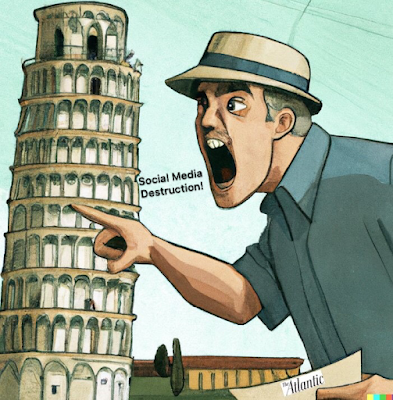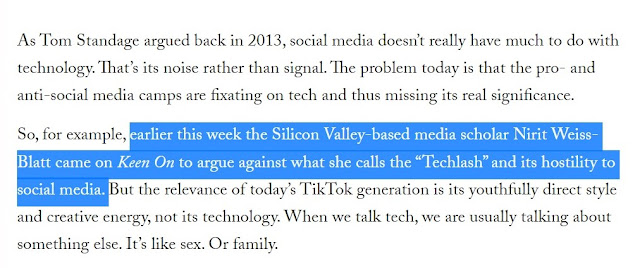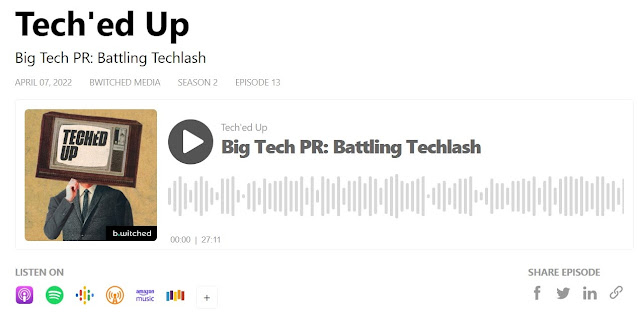Thank you,
Niki Christoff, for
having me on your podcast – it was FUN!
The
transcript below, via OtterAI, was slightly
edited for clarity.
Tech’ed
Up – Big Tech PR: Battling Techlash
- Niki Christoff: Today's guest is Nirit
Weiss-Blatt, an academic who uses AI-powered media monitoring tools to analyze
coverage of Big Tech.
We discuss
how the industry fell from grace from “media darling” to “lead villain.”
The conversation spent some time focused on Uber circa 2017, a year in which I
personally warmed my hands on a PR dumpster fire, and how the company has come
out of that spiral.
In today's
episode, we're talking to Nirit Weiss-Blatt. She has just published a book
called "The Techlash and
Tech Crisis Communications." She's joining us remotely from
California.
- Nirit Weiss-Blatt:
Hi, glad to be
here. Thank you for having me.
- Niki Christoff:
Why don't you tell
me a little bit about where you are and how you ended up writing this book? A
little bit about your background?
- Nirit Weiss-Blatt:
Oh, thank you. So,
now I'm in Cupertino, next to the spaceship. For most of my life, I lived in
Israel. And I've been working there in tech journalism since 2005. So, 17 years
ago. At first, as a Tech PR professional, and then switch sides to be a tech
journalist.
When I was
a deputy editor of a tech news site and finished my Master's degree in
Communication and Political Science, I looked for academic studies on tech
coverage and discovered a significant gap. There was no in-depth empirical
study about the interplay between tech journalism and tech PR. So, with my
background in both, I decided to investigate it myself.
So, in my
Ph.D. in Communication, I examined "who sets the tech media agenda?"
I used an AI-powered media monitoring tool and focused on Big Tech, and retrieved
more than a quarter-of-a-million articles. And the data captured the
emerging Techlash.
- Niki Christoff:
I think it might
be obvious, but Techlash is a combination of technology and backlash, which is
the moment we're currently in. When I started my career at Google in 2007,
doing tech public relations, which I didn't have a background in, I was a
lawyer; I'd worked in politics, and I've done policy work. And I was hired by
Google to work on their quote, "Green PR," you couldn't get a
negative headline. We really never got negative press. Everything was fuzzy
bunnies. I ended up taking the “green energies czar” up onto our solar
installation, which was the largest in North America. And it was, I think,
above the fold on A1 of The New York Times.
Fast
forward to today,
where I'm a consultant, and I still work with tech companies. But it's a
barrel fire. It's not even a dumpster fire. Intentionally, the media is
lighting the industry on fire and burning it, and it couldn't be more
different. Your research studies that arc and what happened. So, I'm
curious; let's start with the causes. What do you think has caused this
Techlash?
- Nirit Weiss-Blatt:
2017 (I should start with that) is
the year of the turning point. So, this is when Big Tech became the
villain, as you said, at least in the tech coverage.
Again, I'm
looking at Big Data and then content analysis. So, in a typical pre-Techlash
year, the big tech companies' peaks of coverage, in their yearly timeline,
their main stories/ main headlines, were either those good initiatives, product
launches, and business reporting. So, like the new iPhone, an IPO, and things
like that. And the negative stories drew considerably less coverage. They were
just not visible in the graphs.
And what I
saw when I analyzed 2017 was that the big stories in the coverage were totally
different, very negative with a lot of tech scandals. So, like, the magnitude
of this shift was stunning.
I
conducted in-depth interviews with key players of the Techlash: so, tech PR
executives from global PR agencies, and gladly, an impressive list of leading
tech journalists, like the tech editors of Reuters, TechCrunch, The New York
Times, and Wired. And together, they illuminated the "inside story"
of the Techlash, the underlying causes.
They were
really open and said "on the record" that what formed the Techlash
was the election of Donald Trump. They actually said that. Their
pivotal moment was the post-presidential election and the belief that
micro-targeting advertising was to blame for his victory.
- Niki Christoff:
For those who
follow the tech industry closely, you interviewed Kara Swisher. You interviewed
Casey Newton, people who are editors and writers - and observers of the tech
industry for the last 20 years.
And by the
way, you were on Mike
Masnick's podcast, which I highly recommend, if only so people can hear his
amazing intro song, which I had not heard until I listened to your appearance
on his podcast. It's a banger, like a nerd banger. It's worth a listen.
But you've
talked to them; you actually had extraordinary interviews with people who
had a front-row seat. And I think that the election of Donald Trump was … as
someone who I have always been on the side of, of the net, where I am working
with the tech companies to tell their stories and to effectively manage Press. People
loved micro-targeting when it helped get President Obama elected.
The makeup
of the people who work in tech largely are progressive liberal; they
tend to give, I mean, there's a lot of analysis of the political giving of
those who work at tech companies, was not aligned with the, with the outcome of
the election. Then, I think it was worsened by Mark Zuckerberg pretending
that Facebook had nothing to do with the outcome of the election.
It's
interesting that your dataset showed that that was a pivotal moment, but I
think it was in the works for a while. It just finally, there was an
outcome that felt unacceptable, I think, even to people within the companies.
And when you have employees leaking against the company, it makes your
press coverage much worse.
- Nirit Weiss-Blatt:
Yes. So, I think
there's a sentence in tech that I'm going to butcher, but it's like,
"things change gradually, and then suddenly." So, yes, we had this “build-up”
for years. And, of course, the Brexit referendum was, again, an event that the
media blamed social media for that.
But I
think 2017 delivered so many different shit shows - that I detail in the
book - that it wasn't just Donald Trump. It's like the easy answer. But it
was people realizing the immense power those big tech platforms have.
- Niki Christoff:
So, 2017 was an
epic year, as you said, for tech “shit shows.” And I think there's this thread
to pull on where a lot of people love the tech itself but hate the companies.
They love the tech and loathe the companies, and I found this especially to be
true; we should talk for a minute about Uber, which you highlight.
I was at
Uber working on their communications response during 2017, which was an
epically bad year; currently being featured on Showtimes’ series "Super Pumped,"
which was based on a book by Mike Isaac, who was our "beat reporter,"
he covered Uber for The New York Times. But Uber is an example where people
loved (and still love) the product but hated the company.
- Nirit Weiss-Blatt:
2017 (as I said) was
a scandalous year. But for Uber, specifically, it was the most scandalous year
in its existence. If with Facebook, we can say that things evolved from bad
to worse, with Uber, it really improved since then. So, that was the year
when everything was disastrous. And then it improved.
As you can
see in "Super Pumped," Travis Kalanick played an important role
in the Uber scandals. So, under his leadership, we had different negative
stories every month. So, the datasets, my graphs, were just going crazy with so
many negative stories that I needed to see, "why do we have a peak of
coverage?" "Oh, three different scandals in Uber this month."
So, of
course, we had Susan Fowler alleged a culture of sexual harassment and
discrimination; Uber was caught deceiving law enforcement with a fake version
of itself, a software called "Grayball." We had allegations of them
spying on Lyft using a secret software called "Hell." And they
didn't deny it. All the articles I collected about it said, "Uber was
not available for comment."
So, those
are just a few examples of how or maybe why Travis Kalanick was blamed for
disregarding rules and norms. Then, they brought Dara from Expedia as the
new CEO - the experienced, more adult, responsible guy to lead the change.
And I think it was admirable that he said, "Yes, we have parts of our
organization that are broken, and we're going to make sure they're fixed."
And then he does it. Uber is not the "scandal machine" anymore. In
the end, actions speak louder than words.
- Niki Christoff:
I think that is
right, that actions speak louder than words. And again, as someone who's been a
public relations professional, in a lot of these meetings, you can only do so
much to fix a problem if there isn't an actual product solution or a change
to policies or a change sometimes the fundamental issue might be in the
business model—Amazon's good example of that. You don't get cheap things
delivered globally. If you want to shop locally, you're going to have a very
different experience. So, sometimes it's just baked into the business model.
Uber is
interesting to me, and I don't think I have Stockholm Syndrome, but I get
really defensive about Uber and that year, and even Travis Kalanick a little
bit.
So, I was
hired to expand, professionalize, grow the Washington D.C. federal government
relations team, basically the lobbying shop. But because my background for the
previous almost 10 years had been in crisis communications, that first Susan
Fowler story, I was asked to fly to San Francisco and then spent the next seven
months doing crisis PR and yelling at Mike Isaac on the phone about his stories
being iterative, and so on, right. That's your job - to have conversations with
the people covering you. But I never defended the indefensible. If something
was accurate, we wouldn't push back on it. But it became hard to control
the momentum of the stories; we couldn't catch a break. Even when we were
doing a lot of really positive things. You just could not get a positive story.
I had a
great team; it was one of the best policy and communications teams on the
planet. It still is; it's a world-class team. And yet, we could not get out of
our own way because we had a total deficit of goodwill going into that first
domino, which was Susan Fowler. Actually, that wasn't the first domino. The
first domino was Travis being on President Trump's business council, which was
something I advised him to do, which was a huge mistake, in hindsight. But at
the time, Disney was on it, GM was on it, Pepsi was on it, and it didn't seem
controversial. But if you're a company with no goodwill, any domino starts to
trend, and you can't get goodwill while you're in the middle of the spiral.
- Nirit Weiss-Blatt:
People don't even
remember the #DeleteUber story, like what was behind it, but it was
actually Uber offering rides while the taxi drivers were protesting Trump.
- Niki Christoff:
When you're inside
these companies, you know that the intention was to make sure we didn't have
surge pricing for people going to protests. But of course, then it was seen as
anti-taxi and anti-labor. So, this goes to something I think is interesting, and
I really would like your thoughts on, which is: How do the companies respond
to things? Because sometimes you just are in this "death spiral"
where "you're damned if you do and damned if you don't."
- Nirit Weiss-Blatt:
I ran a content
analysis on the tech companies' press releases and analyzed how they defend
themselves. And what I found was just the repetition of specific themes over
and over again; it was astonishing like the responses were very much alike. No
matter the company, no matter the negative story, they all used the same PR
playbook. And I called it in the book “The
Tech PR Template for Crises."
So, they
are always the victim of these bad malicious actors who manipulate/
misuse their platforms. And they say sorry and point out good intentions,
good works. Those are things that are "Crisis Communication 101."
And then, they added their unique sentences; famous ones are, "while we've
made steady progress, we have much more work to do. And we know we need to
do better." And then they added, "But our work will never be
done," which is unique to tech companies. We are at a point when they
actually confess time and again that the problems are too big to fix.
So, all
those responses, backlash. So, it's not like they had this magic wand and a
specific statement that went well. All of the statements were not received well;
the media said, "it's BS, and "you don't take responsibility."
It didn't stop them from releasing those same statements again and again and
again. So, the repetition was exhausting. I think for everybody.
- Niki Christoff:
Obviously, there
are best practices when it comes to a crisis. But when the entire industry is
in a sustained multi-year period of negative press, that's not actually a
crisis. That's just a completely; it's the ocean you're swimming in that
is now boiling.
And so,
sometimes, and this, I felt this way, a little bit at Uber, I, and I know I'm
bringing Uber back up, I didn't leave Uber because I didn't like my job. I left
because of the lifestyle of being always on when you're managing crisis comms,
which is also not technically my job; I was hired to do. It's a really brutal
lifestyle; it's very difficult to sustain that level of engagement; you're on
24 hours a day. And you're dealing with things that are literally on the front
page of The New York Times. So, it's extremely high stakes. So, it's a
difficult job.
But I
think that what we're looking at isn't these aren't really crises anymore. It's
an industry under attack. And you think through other industries that
have been in this moment, maybe the financial services industry after
2008, banks after 2008.
Tech, I'm
not sure exactly what the light at the end of the tunnel is going to be like
from a communications perspective. But I'm curious if you think there's
anything communications-wise they can do to help break the ship.
- Nirit Weiss-Blatt:
First, I think there's
a difference between the tech industry and the other industries you've
mentioned because, with tech companies, we had tons of expectations from
them. So, the fall from grace from being like rockstars that you
admire to people you scrutinize on a daily basis is quite unique. Because we
had so much expectations, now it’s like a strong disappointment.
- Niki Christoff: That is so smart.
- Nirit Weiss-Blatt: We're in sentiment now that we
moved from "tech companies are innovative, who save society, so there's a
lot to build" to "tech companies are evil, who harm society, so
there's a lot to fix." And the reality, of course, it's somewhere in
the middle, but it's hard to get any realistic narrative.
So, under
this attack, as you said, and they are in the boiling water, as you said, I
think they're now just fighting harder. They're saying, "okay, the
pendulum has swung too far in the negative direction. As if we can do no good,
only harm," while they see themselves as a good force in society. So, it
becomes like, "we're just going to have our own solutions and won't be
distracted by the outside criticism." No more apologies, only counterattacks.
One of the
reasons they fight harder now is the political pushback that we have this
wave of tech regulation around the globe, a "tsunami of bills," and
some of them are frightening and potentially will take a lot of what is good on
the web, along with the bad.
I think their
new messaging should be that "yes, we have a lot of problems. But they
require a scalpel, not an ax."
- Niki Christoff:
So, first of all,
you're right. There's a tsunami of regulation tech is facing globally. And I
think some of that is related to people's genuine frustration with the state
of the world and seeing tech as a cause of that, as opposed to potentially a
symptom of it, right? So, the idea was it was going to be great to connect
everyone on the planet. And I think it maybe was a terrible idea. I don't think
it actually went that great. Connecting people anonymously by the billions has turned
out to be deeply problematic when you look at social media.
But also,
I think our memories are short for how magical things are, the things
that Tech has done that are really positive. So, I mean, Uber provides work for
people who are in a period of unemployment. Washington D.C., where I live, has
the highest number of hard-of-hearing drivers because that's a population that
has a hard time finding any work. As a woman who had to flag down a taxi in the
middle of the street at two in the morning until not even 10 years ago.
There're
so many positive things about the technology. And yet, we're upset about the
low wages, and we're upset about what feels like an extractive model. And we're
upset in general about sometimes real things. But sometimes, things we imagined
to be the tech industry's fault, right? So, they're taking a lot of blame
because people don't even hear the positive things that they're doing.
- Nirit Weiss-Blatt:
If the media has
any bias, it's pro-conflict. You need to have a hero and a villain. You
need to be either like saviors or threats.
- Niki Christoff:
A great example is
another wonderful investigative journalism exercise, Theranos and “Bad Blood.” I'm
currently watching "The
Dropout" on Hulu, which I highly recommend. It's so watchable; it's
great dialogue. It's a great soundtrack. But it's an example of this inflated
heroine who then, she talks about disappointing people, becomes a villain.
- Nirit Weiss-Blatt:
Well, Theranos
is a unique story in history that I don't think is emblematic of the tech
industry or other tech startups; it was really just a wild, crazy story. But it
relates to the "cult of the tech founder" of how we like, for
decades, glorify them as geniuses, and then again, from one extreme to the
other, you fall down hard.
- Niki Christoff:
I think that's
right. When you work at a founder-led company, you work within a
dictatorship. So, depending on the thickness of the founders' skin, that
will dictate how the PR team is approaching coverage. And you see a little bit
more, not a little bit, a lot more of a tolerance for negative stories and sort
of a reasoned approach to the press - when you are looking at Microsoft, which
right now is not led by a founder; when you look at Apple, which is not led by
a founder. Right? These are companies where I think they're able to be a little
bit more nuanced.
But when
the founder sees the company as an extension of their body, it's really hard
for that person, who is again a dictator, to tolerate negative press. So, you
might be responding in a way that's counterproductive as a team. Not because
the team doesn't think they should be doing something else, but you just don't
have a choice.
Facebook
is the ultimate, in my opinion, top of the “villain list.” And do you have any
thoughts on that? Do you have thoughts on (you mentioned) Cambridge
Analytica?
- Nirit Weiss-Blatt:
When we had the exposé, Mark Zuckerberg
was absent.
So, that's like a great case study on how NOT to behave in the face of a major
crisis. For five days, which felt like five years, government officials
have summoned Zuckerberg to speak. Journalists and his own employees have
demanded to hear from him. But he's been absent. He didn't show up to
the company's own internal staff meeting. Eventually, he published a Facebook
post, of course, and then came all the "I'm extremely sorry, I'm extremely
sorry."
Looking at
crisis communication literature, the research found that the longer an
organization takes to respond to a crisis, the more it suffers in the eyes of
the public and stakeholders. Now, it's understandable that Mark needed to
gather all the facts, maybe like most of the facts about what happened before
you know, issuing a response takes time. But the initial crisis was response
should have been released using, as we said, the well-known PR playbook, just
to lower the flames of the fire. And his disappearance was a total PR
disaster. And it was perceived as a profound lack of accountability.
- Niki Christoff:
I mean, in
Washington, his absence was almost palpable because Sheryl Sandberg would be
sent out as the “human shield.” And she would say, and it was so jarring to
hear her say this, "I'm so sorry. And I know Mark is so sorry." And
you're thinking, “the CEO should be saying he's sorry. He shouldn't be sending
Sheryl to say he's sorry.” This is not an effective communications playbook.
But it's again; it's not because they don't have smart PR people. They have
great PR people. It's that the decision isn't made by that team.
We've
addressed how it used to be in the heyday; it was bright, shiny objects. And I
remember reading in some of the excerpts from your book that people thought it
was like a
"celebrification" of these founders. And maybe there was a bit of
that. But also, we were getting magical tools on a quarterly basis. But let's
take it to current events. What do you think is what's the current state of
play?
- Nirit Weiss-Blatt: So, just before handing in my
book, COVID hit. So, I managed to add this small chapter that I called "The
shortest pause of the Techlash." It's like this "short honeymoon
phase" at the beginning of the pandemic, where everybody was like,
"we're thankful for the web, and thank God, we have those
inventions." And then, of course, the Techlash resurfaced.
And I
think now, we have the same thing with the Russian invasion. And being
overwhelmed by the Russian invasion and how it played out online, I decided to
sit down and outline the main themes I saw - both positive and negative. And we
had positive, so, that's, again, noteworthy because there were actually a
few solid positive narratives.
The negatives
are obvious: People are calling out social media for fueling a new type of
"fog of war," where information and disinformation are
continuously entangled with each other, clarifying and confusing in
almost equal measure.
And the Russian
government restricting access to online services, of course, intensified
everything. It's a serious thing that it continues to splinter the open
Internet.
So, people
started to point out the importance of end-to-end encrypted messaging apps.
At the start, people were calling it "the first Tik Tok war," when
in fact, it evolved into a "WhatsApp war," where people have no
choice now but to rely on WhatsApp, and signal, or Telegram, and be
thankful that they exist, right?
So, we
have positive aspects about that, but also about just regular people debunking
falsehood in real-time, a wave of global protests, huge donations, and empathy.
And all of this - sheds light on good uses, not misuses, but good uses of
the web.
So, I
think it's a point in time when we can see a more balanced coverage. I think,
for the tech platforms, it's like, way better, and way worse, at the same
time. Because we have gratitude for their inventions, they help
civilians now cope with this war. But at the same time, we realize their
immense power.
- Niki Christoff:
The platforms are
not good or bad; what we do with them, how we choose to engage with them. I
think that you're right. This highlights that dichotomy that it is both good
and bad; we are totally reliant upon the platforms. And also, they are a
lifeline. There is this array of seeing exactly what they were good for. And
this isn't the first time the Arab Spring; it's just reminiscent, right? That's
something you've said in tech, “It's Groundhog Day.” Once again, we see people
suffering who are using these tools in a very positive way. So, the pendulum -
it will swing.
Maybe
we'll end with me being an apologist that will give you something as a final
word. But I worry a bit you mentioned conflict and how the press is driven by
conflict. It concerns me a little bit that reporters, and they have to, right?
So, when I started in tech, you could be a reporter and make a great living.
And you didn't have to post on Twitter all day long and try to get clicks for
your articles; it was, you had more time, more breathing room to write your
stories. And you weren't competing with non-journalists, right? You weren't
competing with influencers who don't really follow the rules of journalism and
standards of practice of editing. So, now, you're in this race, right?
Almost, I would say, a race to the bottom of speed and clickability.
And I'm
concerned that a lot of the big book deals and the books being turned into
movies -- although I want that for my friends who are reporters, and I think
they should be able and it's important that you can make a living being an
investigative journalist and a reporter -- It concerns me that it's going to
put a bounty on more difficult coverage that at the end of the day, can create
an outcome we don't want.
Because
these are, for better or worse, these are American companies, they're public
companies, they have rules of governance and the rule of law. And a lot of what
they're doing isn't illegal, it might just be immoral, or we don't like it.
And the alternative, which could be something coming out of autocratic states,
we don't know what the alternative is. But I don't think we should have a lack
of imagination for what the world could be like if we tie up the U.S. companies
too much. I think it could be a dystopian future that people aren't even
thinking about. So, I'm a little thoughtful of putting too much gas on the
barrel fire.
- Nirit Weiss-Blatt:
I can't agree
more. I mean, in the ending paragraph of my book, if you survive the 200 pages
before that, and you reach the end, what I say at the end is this manifest of “okay,
we've been over utopian, but we're clearly over dystopian now.” And we
should seek a more nuanced discussion and not the over-simplistic
solutions, which will spill the baby with the bathwater.
- Niki Christoff:
Nirit, thank you
so much for talking about this. It's very hard for me to be objective because
this has been my professional life since 2007. When I just sort of fell down,
like accidentally fell into doing tech PR. I wasn't in public relations before
that. And I really wasn't even interested in tech, and 15 years later, I've had
a front-row seat to watch this phenomenon. And I come out exactly where you
are. And you've looked at big datasets, and you've written this academic
assessment of the trends and talked to experts and really, hugely
influential people for your book. And you've come to the same place that
intuitively I come to, which is: it's hard for us to have nuanced conversations
and to have a nuanced perspective, but we must.
Thank you
so much for coming on and taking the time, and we'll link to your book in the
show notes.
- Nirit Weiss-Blatt:
My pleasure. TechlashBook.com.





















